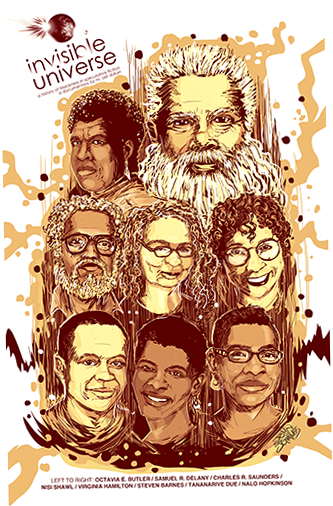How Can We Use New Storytelling Tools to Explore Visionary Futures?
An Immerse Response: Centering people, their connections and their ideas
 Poster
design by John Jennings
Poster
design by John JenningsFor me, storytelling is always less about the tools that I use and more about my desire to create, explore and/or express an idea.
Whether I use a pen, a camera or a computer, my goal is to create new narratives that offer up different worlds and futures, and while the methods I use vary, the common factor is passion. This passion is not just guided by my artistic endeavors, but informed by my perception that the world I live in is dominated by stories that, for instance, value inequality, misogyny and white supremacy. It’s this perception that also challenges me to create work that counters these insidious narratives.
Since I began production on my documentary, Invisible Universe, I have been interviewing people, documenting events and speaking publicly about the birth of an informal network of makers of speculative fiction (fantasy, horror, science fiction, etc.). The people who make up this movement of Black speculative fiction creators are not monolithic. They come from various backgrounds, work in assorted forms and media, have diverse perspectives and worldviews, have different access to resources, and work individually, collectively or both.
But they all have at least one thing in common: they all envision worlds and futures much different from the limited ones that have been fed to us for centuries. And they have coalesced during a historical moment when transformative narratives from a new collective imagination are desperately called for to help shift us away from the lack of imagination of the rulers in this world. The people in this movement, consciously or not, but definitely passionately have responded to this “call” by exploring visionary futures (or presents or pasts) in their various works.
And yes, this is not the first time that Black creators have used speculative fiction as a way to imagine visionary futures. The history of Black literature is filled with it. There have even been periods that may qualify as collective movements of imagination. First during the second half of the 19th century when creators like Martin R. Delany, Sutton E. Griggs, Pauline E. Hopkins and others produced pioneering speculative narratives on the Black experience. Then again, more recently in the 1960’s and 1970’s, creators Samuel R. Delany (no relation), Virginia Hamilton, Octavia E. Butler and others literally integrated the racially homogeneous speculative fiction industry.
The earliest form of the current movement originally began to take off in 2000, when Sheree Renee Thomas debuted her anthology, Dark Matter: A Century of Speculative Fiction from the African Diaspora. The book single-handedly introduced (or re-introduced) nearly thirty fictional writers and their works to the world under the banner of Black speculative fiction.
The evolution of the movement today has granted it ever-increasing access to computer technologies and social media networks, which has allowed it to grow exponentially since that time. But even though this movement’s strongest presence is online via social media sites like Facebook and Twitter, its offline efforts are not to be outdone. With regional strongholds in places like Philadelphia, Detroit, Atlanta, New Orleans, Seattle and in southern California, these groups are well-represented on a local level. But I think the most impressive aspect of this movement is the members’ passionate self-awareness of the importance of their collective imagination. Consequently, I believe this passion has inspired them to take actions (publishing anthologies, participating at cons and producing their own events, etc.) to ensure that their presence has a larger impact on the wider speculative fiction culture — artistically, socially, politically and economically. And because of this, the future may never be limited again.
So, all of this is to say that I believe that storytelling tools are a secondary concern to exploring visionary futures. They supplement and may aesthetically enhance stories, but are not necessarily the most important element. I believe it is when connections among like-minded people and groups are made, like with the Black Speculative Fiction creators or the Detroit Narrative Agency that adrienne wrote about, that real exploration and envisioning can happen.
One of my favorite quotes from Octavia E. Butler spoke succinctly to the idea of why she chose to explore visionary futures in her own work. “I was trying to write myself in,” she explained. Like Octavia, I also value centering people, their connections and their ideas in visionary futures.
Immerse is an initiative of Tribeca Film Institute, MIT Open DocLab and The Fledgling Fund. Learn more about our vision for the project here.